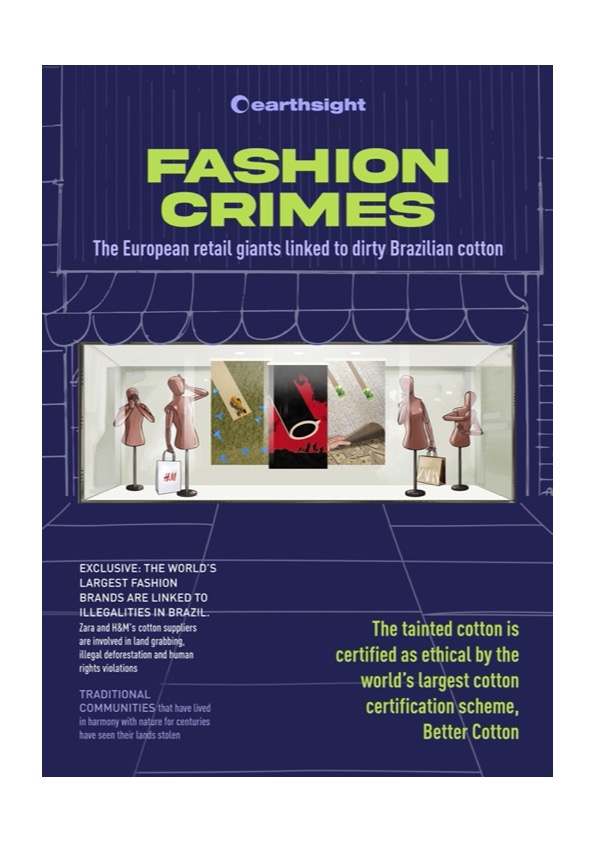Earthsight Ong Linking European Giants to Illegal Activities in Brazil
According to the British NGO Earthsight, the cotton used by textile giants H&M and Zara to produce their clothes is dirty cotton.
Specifically, the NGO alleges that the two European brands are complicit in large-scale illegal deforestation activities in Brazil, including land grabbing, human rights abuses, corruption, and violent land conflicts. But this revelation is particularly alarming as it implicates Better Cotton, a certified sustainable cotton label. If you heard us say certifications worth zero, here’s the proof.
Fashion Crimes: The report on dirty cotton
Using satellite imagery, court decisions, product shipping records, and undercover investigations, Earthsight has compiled a report titled ‘Fashion Crimes.’ The result is a damning portrait! Cotton certified as ethical by the world’s largest certification system, Better Cotton, is found to be contaminated by numerous environmental offences. Also, this cotton is exported to various Asian manufacturers, producing approximately 250 million clothing items and household articles annually for H&M, Zara, and their sister brands’ global stores.

The NGO has tracked the journey of 816,000 tons of cotton from two of Brazil’s largest agroindustrial companies, Horita Group and Slc Agrícola, in Western Bahia. Traditional communities lived in harmony with nature. But greedy agricultural companies serving global cotton markets attacked them and robbed their lands. The Brazilian families who own these lands have a lengthy history of legal proceedings, convictions for corruption, and multimillion-dollar fines for illegal deforestation.
Some of these illicit activities take place in the Cerrado region, a savanna renowned for its rich fauna and flora, constituting the second most important biome in Brazil. The Cerrado, which hosts 5% of the world’s species, saw a 43% increase in vegetation destruction in 2023. The clearing of Cerrado trees for agriculture generates carbon equivalent to the emissions of 50 million cars each year.
Environmental protection is a key issue for the European Union, which has included the new European Deforestation Regulation (Eudr) in the Green Deal. A program against climate change that encourages the consumption of certified raw materials and imposes restrictions on the importation of those produced in deforested regions.
“Earthsight’s year-long investigation reveals that corporations and consumers in Europe and North America are driving this destruction in a new way. Not by what they eat – but what they wear.”
Better Cotton: certifications & greenwashing
In conclusion, the NGO points the finger at Better Cotton, the world’s largest ‘ethical’ cotton certification system, with the raw material exposed as dirty cotton. Therefore, contaminated by various environmental offences. “BC has been repeatedly accused of greenwashing and criticised for failing to allow for full traceability of supply chains.”
Therefore, can we trust sustainable labels? No, of course not! Left alone, labels and certifications mean nothing. In fact, they are frequently used to mislead people. So, they are just greenwashing. Moreover, selling more green products is a strategy to support the overproduction model. So, it won’t solve any issue. (Download “The sustainability basics” checklist here).
Even though brands like Zara and H&M might use sustainable materials, the massive quantities they produce would nullify the sustainable effort. Why isn’t this clear? The solution is plain: we must produce and consume less. It’s the only viable strategy in the face of such devastation.
Consumers play a crucial role in perpetuating these harmful practices, often unknowingly. By reducing our consumption and demanding accountability from brands, we can make a real difference in protecting the environment and promoting sustainability.
While uncovering dirty cotton practices is crucial, it’s imperative to recognize that consuming less is fundamental for sustainability. Consume less: this is the action we must take now!